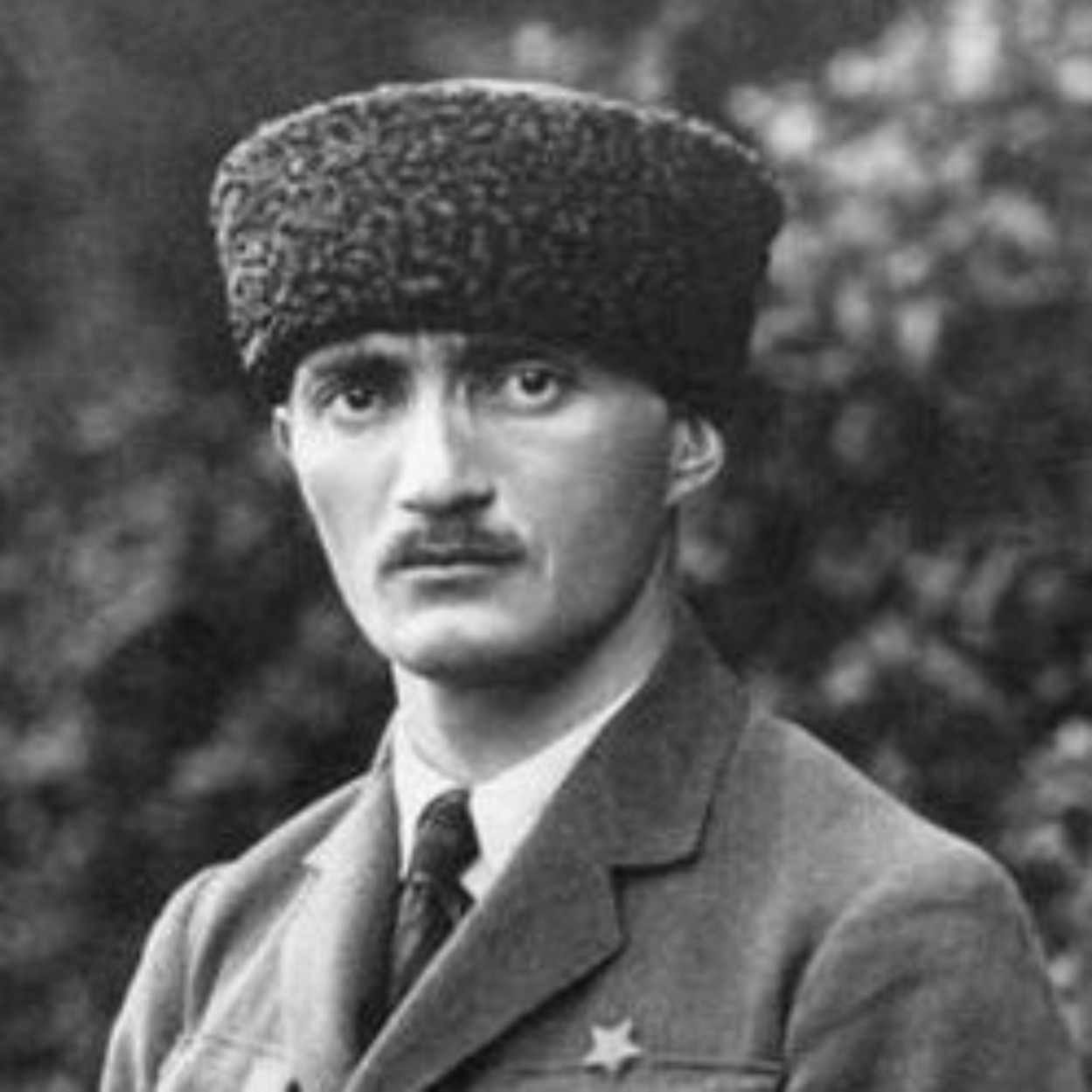| Nestor and Abkhazia Nestor Apollonovich Lakoba was born in the village of Lykhny on May 1, 1893. His father, the peasant Apollon Lakoba, died three months before the birth of his son: he was killed for a harsh speech at a peasant gathering against the extortion and arbitrariness of princes and nobles. Mother Shahusna Dzhergenia alone raised three sons, with no help and support from the outside. With great difficulty, she managed to send little Chnagua (this was Nestor's name at home) to study at the Novy Afon parish school, after which he entered the Lykhny two-year school. Wherever Nestor studied, he stood out among his peers with his abilities and character. |
“
He was a favorite of schoolmates who worshiped him. There, where games, fun, sonorous songs and impetuous mountain dances were - you could always see a short figure of a boy with lively black eyes and a thick hair of a raven's wing color
At the age of twelve he entered the Tiflis religious school, but religion was of less interest to him.
The schoolmaster wrote in the reference of "the student Lakoba" that he read "illicit books and is friends with high school students." At the end of the school, Nestor continues his studies at the Theological Seminary, from which he is expelled a year later because of his participation in a secret revolutionary circle. He had to leave Tiflis, and he moved to Batum. Revolutionary ideas still attract the young man. In 1912 Nestor Lakoba joined the ranks of the Bolsheviks of the radical wing of the Russian Social-Democratic Labor Party. After some time Batum police calls the propagandist-Abkhazian for questioning, and Nestor again decides to change his place of residence, choosing this time Grozny, where he enters the Grozny real school. In 1915, after graduating from college, Lakoba tries to continue his studies at the Faculty of Law of Kharkov University, but soon, due to the meager financial possibilities, he gives up the university and returns to his homeland.
In Abkhazia Nestor Lakoba started working on the railway in Gudauta. He remained here in the heart of social life.
The empire was going to pieces: the February Revolution of 1917, the March abdication of Nikolay II from the throne, - by April, popular unrest had reached Abkhazia. At a large meeting of peasants in the meadow of Lykhnashta Nestor Lakoba is elected as the district commissar of Gudauta. A little later, a revolutionary peasant squad "Kiaraz" was created, and Nestor became one of its leaders. From that time until the establishment of Soviet power in 1921, a struggle for power between the Bolsheviks and the Mensheviks developed on the territory of Abkhazia (Georgia was Menshevist-Ed.). The victors were changing. Nestor then had to hide somewhere, he again returned to Abkhazia, and at the end of 1918 he got to Sukhum prison. In 1920, fate again brought him to Batum, where he led an underground revolutionary movement. Here, settling in the house of his friend Adzhar Aki Dzhikh-ogly, he meets his sister, the young beauty Sariya, who was destined to become his wife.
“
Then they fell in love with each other. She was fifteen (like me) when she ran away with him.
In the lead of Soviet Abkhazia
On March 4, 1921, Soviet power was finally established in Abkhazia. The beloved of the Abkhaz people, Adagua, which means "deaf" in Abkhazian (Nestor did not hear well and therefore wore a special hearing aid, ed.), he returns to Abkhazia, where he becomes not only a ruler but also, at some point, the keeper of his native land.
In February 1922, Nestor Lakoba was elected chairman of the Council of People's Commissars, and from April 1930 he was chairman of the Central Executive Committee of the Abkhaz ASSR. Under the leadership of Lakoba, a revival of the decayed and desolate republic began.
“
On the example of a small Abkhazia one can see how quickly the Soviet country becomes highly cultured ... The Abkhaz government, under the enlightened leadership of the esteemed Nestor Apollonovich Lakoba, has always shown exceptional attention to science, drawing in every possible way all-Union scientific institutions and creating its scientific research institutes and stations in Soviet Abkhazia
In the sphere of the national economy, Nestor Lakoba did not undertake collectivization
(the policy of the Soviet leadership, when the peasants were deprived of private property (livestock, land) and, by uniting them, created collective farms - colkhoz farms-ed.).
Moreover, taking into account the peculiarities of the Abkhazian way of life, he did not victimize princes and representatives of the upper class and aristocracy, always referring to the fact that in Abkhazia there was no clear stratification of poor peasants and "enslaving" their princes. This policy of Nestor, which was considered fair and for which he was respected among the people, was contrary to the general Soviet plan of transformation and was not liked by everyone - the matter even reached Stalin: the well-wishers formed an anonymous letter, and Nestor had to appear before the leader with an answer. Despite the fact that everything was against the leader of Abkhazia, he made a speech in the Kremlin, which made everyone believe in his rightness. Needless to say, he possessed extraordinary oratorical abilities.
“
Abkhazians are a few people, and a considerable part of them are princes and nobles in origin, although they often live like ordinary peasants. Virtually no one ever lived in Abkhazia, like a prince, in the full sense of the word. If I had expelled these people, with whom would I have carried out the reforms planned by the Soviet government, who would have protected Abkhazia and created the Abkhaz Republic? They rose to fight against the Georgian Mensheviks. They created guerrilla detachments and stirred up the entire population of Abkhazia.

Nestor Lakoba (left), Lavrentiy Beria, Agasiy Khandzhyan at the party conference, 1935
© The State Museum of Nestor Lakoba
© The State Museum of Nestor Lakoba
Сам Лакоба никогда не имел охраны, ходил по городу пешком и был очень прост в общении, что безмерно подкупало всех от мала до велика. Он принимал людей не только на работе, но общался с ними прямо на улице, по дороге домой, прогуливаясь на набережной или даже сидя в кофейне.

Sariya and Nestor Lakoba
© From personal archive of Musto Dzhikhashvili
© From personal archive of Musto Dzhikhashvili
Nestor was really respected and loved by the people. Moreover, his appearance as a leader was considered something divine.
People were composing legends about him. One of them is described by the historian Ruslan Gozhba. About a shepherd, tending his herd in the high mountain village of Pskhu and hearing the conversation of three prophets who descended from heaven and appointed a certain "Chnagua" among themselves "ruler" of all Abkhazia. Later, this shepherd told what he saw to the sage named Mukba, and he, they say, met a young man who called himself Chnagua, on the way from Eshera to Sukhum, he was Nestor.
Of course, all this is just a legend, but it is firmly entrenched in the people who wanted to believe that Nestor was given to them by the supreme powers. People went to his house, told about their troubles - someone was hurt by people's commissars, someone asked to help starving relatives, and no one left without his attention.
Of course, all this is just a legend, but it is firmly entrenched in the people who wanted to believe that Nestor was given to them by the supreme powers. People went to his house, told about their troubles - someone was hurt by people's commissars, someone asked to help starving relatives, and no one left without his attention.
“
One can get a perception of the peasant identity of Abkhazia in Sukhum only in the reception of the Chairman of the Sovnarkom. To Comrade Lakoba, or, as the peasants simply call him, in the eyes and behind his eyes, to Nestor, they go with all sorts of business, bypassing all instances, in the assurance that he will listen and judge. Chairman of the Sovnarkom of Abkhazia, Comrade Lakoba, enjoys the love of the peasants and the entire population. Comrade Zinoviev (Gregory Zinoviev, Soviet political and state figure - editorial note), when he was in Abkhazia, joked that Abkhazia should be renamed Lakobistan
Lakoba and the "isolation" of Trotsky
Without knowing it, Nestor Lakoba played a crucial role in the fate of the Soviet state. In January 1924, Lenin was at death, and struggle for power in the margins of the Kremlin was already burning. Lev Trotsky was one of the likely successors of Lenin as head of state, and his opponents needed to do everything to neutralize politics. Shortly before this, at the request of the doctors, Trotsky, along with his wife, took a train from Moscow to the Caucasus. Simultaneously, at once two prominent party figures - Felix Dzerzhinsky and Sergo Ordzhonikidze - write to Lakoba, unequivocally hinting that he was entrusted with Trotsky's "isolation". "A lot has been, apparently, at stake during this visit of Trotsky to Abkhazia. Or rather, his temporary isolation," Stanislav Lakoba writes, commenting on the entire situation that took shape three days before Lenin's death.
The news that Lenin died, overtook Lev Trotsky in Tiflis.
Upon learning of this, he immediately informed the Kremlin that he was returning to Moscow, but Stalin replied that he did not have time for the funeral, so let him go to Lakoba - Trotsky's health for the party is more important. That he was deceived, Trotsky already found out in Sukhum, visiting Lakoba - Lenin's funeral was postponed for a day, and, having left when he intended, Lev Trotsky would have managed to come to parting with the leader. What happened was very bad for Trotsky's authority in the eyes of the party leadership, which, in fact, Stalin sought.
Lakoba received Lev Davidovich so well that he remained in the "nature-loving country" for two months, immersed in the traditions and culture of the local people.
"Trotsky and Lakoba traveled all over Abkhazia, were frequent guests of the peasants, visited rural gatherings. On one of them in the village of Mokva, Trotsky made a speech. He began it according to all the rules of Abkhazian oratory. His first phrase was a ritual appeal, which he pronounced in Abkhazian: "The people, your hardships to me ...". The people gasped in amazement. For the peasants, this became the main thing in his speech," writes historian Stanislav Lakoba.
Stalin highly appreciated the help of Lakoba in the "isolation" of Trotsky.
"He believed that Nestor contributed to strengthening his position in this difficult transition period," Stanislav Lakoba writes. "This is the mystery of Stalin's so long (almost twelve-year) disposition to Lakoba. On this basis, the leader brought Nestor closer to himself, and as if by accident, he publicly joked: "I am Koba (the party nickname of Joseph Stalin Ed.), And you are Lakoba." .
Koba, Lakoba and Beria
The friendship between Lakoba and Stalin was strengthening year after year. On many occasions Stalin visited Abkhazia and was a frequent visitor in Nestor's home in the village of Lykhny. The leader took the abista from the hands of Sariya, drank the wine of Nestor in small sips, and the host's mother, Shahusna was preparing a meal in the kitchen. Sariya was friendly with Stalin's wife, who singled out her from all "party" wives and even gave her a personal car, one of the first in Abkhazia.
This disposition of the leader to the family of Lakoba was maliciously envied by Lavrenty Beria.
Taking the first steps along the career ladder, he quickly realized that, making friends with Lakoba, he could also reach out to Stalin. Beria even christened Rauf, the son of Nestor and Saria, and became well received in their house. The nomination of Beria took place with the assistance and, it can be said, at the request of Nestor, for it was he who advised Stalin "to nominate this young energetic Chekist for the leading party work." On November 12, 1931 Beria became the second secretary of the Transcaucasian Regional Committee of the AUCP (b) (The All-Union Communist Party (Bolsheviks) ed.) and first secretary CC CP (b) of Georgia (The Central Committee of the Communist Party (Bolsheviks) - ed.).
"Snake with glasses" – they called Beria for his eyes (he wore a pince-nez - ed.), he used all sorts of tricks, tried everything in every way to please the leader and show him that he would not find a dog more loyal.
This manifested itself even in small things. When Stalin, walking through his dacha, half-jokingly suggested that we clean the garden of weeds, it was Beria, having got hold of an ax, with such frenzy, cut down the unfortunate bush, that to all who watched this scene, for a moment it seemed that he chopped not shrubs, but "heads of opponents". This episode is described in some detail by the brother of Saria Musto Dzhikh-ogly in his memoirs. Lavrenty Beria climbed the party ladder higher and higher, and eventually it turned out that Nestor Lakoba, who was originally much closer to Stalin, was in full submission to Beria.
Said "no" to Stalin
: A turning point in the secret struggle between Lakoba and Beria was in 1936. Stalin begins to think about transferring Lakoba to the position of People's Commissar for Internal Affairs in Moscow, inviting him repeatedly to his place, but Lakoba repeatedly rejects this proposal. After another refusal to the leader, he tells his wife: "Why did Stalin offer me such a high post? I will never give consent; even if they threaten me ... My people are still eating aparchpan (abh. - "prickle", Ed.), and I will go to the top?! I will never agree to this." Adil Abbas-ogly writes about this in his book "I Cannot Forget." It was most likely not only that Stalin offered him the bloodiest post of that time, but because Nestor felt that he was being removed from Abkhazia so that Beria could do whatever he wanted there. The idea of "Georgianization" of Abkhazia has long settled in the head of the latter.
And this idea, alas, was not new. Back in 1929, at a meeting of the Transcaucasian Regional Bureau of the Communist Party (Bolsheviks), where all unanimously supported the entry of Abkhazia into Georgia as an autonomous republic, when everything seemed to have been decided, Lakoba was the last to be asked. And he answered: "I heard nothing. The hearing aid does not work well for me." It was considered impossible to repeat everything anew, and the question was postponed for a while, although later it was decided positively.
Nestor Lakoba did not give up hope that the Abkhaz ASSR would leave the Georgian SSR and join the RSFSR directly. With such petitions he was in Moscow more than eighteen times, but was not heard.
"Only over my dead body"
In December 1936, Beria called Lakoba in Tbilisi. The meeting was stormy, they quarreled. According to Professor Stanislav Lakoba, the reason for the quarrel between Lakoba and Beria was the plan to resettle Georgians to Abkhazia, which the latter showed to the leader of Abkhazia, to which Nestor Lakoba said: "Only over my dead body." Without knowing it, he signed himself a verdict.
In the evening of the same day, the mother of Beria began to call the hotel room of Lakoba, then his wife Nina came and persistently invited Nestor to dinner for his favorite dish - fried trout. He came to Beria's house, but he did not touch anything, only drank some cognac and ate a piece of fish. Already after ten minutes he left, feeling bad. He will say only one word in Abkhazian in the car to the driver: Syrshit. (In translation from the Abkhazian "They killed me" - Ed.). On the same evening Nestor Apollonovich was summoned to watch ballet in the Beria's theater box. From there he was taken almost unconscious. At midnight on December 26, Lakoba died in Tbilisi. Later it will be reliably established - he was poisoned with cyanide.
january 1, 1937
The funeral of Nestor Lakoba
© The Abkhazian State Museum
© The Abkhazian State Museum
© The Abkhazian State Museum
With the death of Nestor, began one of the darkest times in the history of Abkhazia – he will be called "public enemy", closest relatives, including the wife Sariya Lakoba and the son Rauf, will perish in the NKVD chambers (the People's Commissariat of Internal Affairs of the USSR - ed.). But even the dead Nestor caused trouble for someone. First, his body will be reburied from the crypt of the Sukhum Botanical Garden to the Mikhailovskoye cemetery, and later a semi-detective story will begin with the remains: according to one version it will be burned in the limestone pit in the Mayak area, according to the other - the wife and mother, after learning that the grave is about to be leveled with the ground, managed to secretly organize a reburial, but showed the burial place to no one. Anyway, Nestor's graves does not exist today.
Author of the text - Arifa Kapba, photo-editor - Naala Avidzba, editor-in-chief - Amina Lazba
